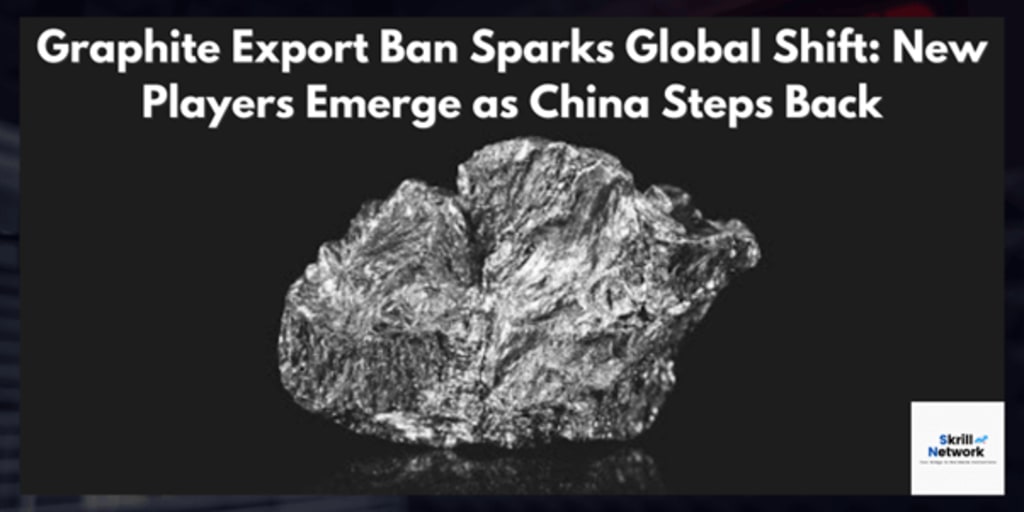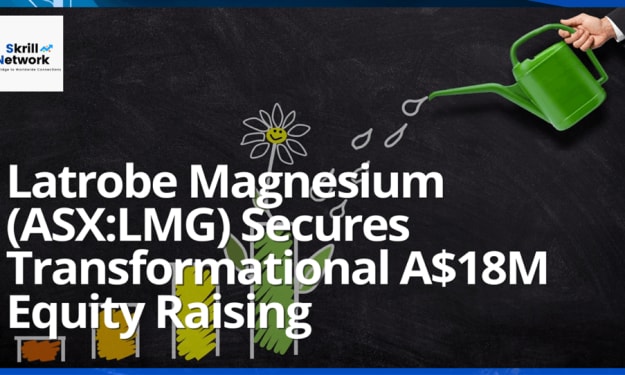Graphite Export Ban Sparks Global Shift: New Players Emerge as China Steps Back
Skrill Network

On October 20, 2023, China announced a list of restrictions on their Graphite exports, urging manufacturers to gain permits for some graphite products including natural flake graphite items and high pure, hard synthetic graphite items. This happened in the wake of several bans that Europe and the US had put on China for various goods. This development has happened in the backdrop of the US ceasing semiconductor imports to China, including the quality-tested Nvidia chipsets.
The Netherlands also followed suit and decided to do the same with their own share of equipment from China to their country. As China proceeds to halt Graphite exports the opportunity for other countries to capture the market is possible. In this piece, we will deeply look into the alternatives and descriptively deconstruct the reasons behind the Chinese ban.
China: World's Largest Exporter of Graphite Products
Graphite Collection in an Indian Museum in Kolkata
(Source: www.commons.wikimedia.org/)
China accounts for the world's third-largest naturally occurring Graphite ores. In retrospect, it's Turkey that accounts for the largest Graphite ores followed by Brazil. China produces finished Graphite and supplies 80–85% of the global demand. China's Shangdong Province supplied a vast chunk of this demand fulfilled by the Pingdu mine as the site produces Spherical Graphite. However, due to depreciating ores, China has transitioned to other Provinces supplying the globally needed mineral.
China currently has 2 new mines in Heilongjiang, Jixi/Mashan and Luobei provinces. It produces small flaky graphite from these zones. Graphite has been an important mineral recently because of climate change and shifting towards EV modes of transportation. It is used to manufacture the anode part of EV batteries that possess a negative charge.
Photo of Tesla Autopilot two board semiconductor
(Source:www.commons.wikimedia.org/)
Reasons Behind China's Ban
There remain certain events that unfolded which could be some of the trigger points for the ban. China being the world's largest critical mineral supplier required to make EV batteries, took advantage of its clout to disrupt the supply chain amidst growing anti-Chinese sentiments in Europe and the US. Here are a few incidents to put this into perspective.
As per a piece written by Reuters, on October 21, 2023, China has made this move amidst Europe's determined protest against Chinese EVs that have changed the automobile industry's dynamics in the region. Many nations of the continent have levied high tariffs on Chinese-made EVs citing that Chinese products have an undue advantage of having subsidies so their price is significantly lower compared to European counterparts, hence levying taxes is the right thing to do.
The US has also placed a semiconductor export ban on China. On Friday, October 20, 2023, Joe Biden met with many EU officials and discussed a host of issues and negotiated on critical minerals.
Just before this move China also banned critical minerals Gallium and Germanium which were used to manufacture semi-conductors. China supplies 60 and 90 % of these critical minerals. This happened in the wake of tightening laws by the US on stopping semiconductor exports to China.
The official response to the ban, the Chinese Govt's department cited national security interests and intelligence as top reasons for the move as stated by the Commerce Ministry while talking to Reuters. The ministry talked about preserving the global supply chain and ensuring stability in the process and this move ensures that happens. The ministry reiterates that these kinds of temporary restrictions were always there with high-grade Graphite, and also mentions that only specialized Graphite was asked to ensure permit clearance, other common Graphite for steel and metallurgical industries remains to be traded without restrictions.
Northern Graphite CEO Hugues Jacquemin, in his press statement, told the media that China's recent move suggests that it does not want the Western nations to manufacture EVs (Electric Vehicles).
A Centre for Strategic & International Studies (CSIS) report discussed this sudden ban and stated the Chinese ban might have occurred in the wake of many economical security policies by the West against the former. It is an act of China leveraging its global control over Graphite which is a key ingredient in manufacturing negative cells in EV batteries.
In CNN Business Web Portal, reasons cited by Stefan Legge, head of tax and trade policy research at Switzerland's University's St Gallen, were that China has been playing tit for tat and implementing Newton's third law in motion, that every action has an equal and opposite reaction. They want to tell the world that the problem of protectionism and taxation only spreads.
Graphite from Ailbert, Siberia on display in Naturhistorisches Museum, Vienna
(Source:www.commons.wikimedia.org/)
Looking for alternatives
Every country is trying to meet its Graphite needs in its own ways, and also there exists an opportunity, a vacuum to fill, and some nations are considering other regions to be their supplier. A CSIS report states that in the US China is not the only Graphite seller, there exist other potential suppliers including Mexico which supplies 21% of their demand, followed by Canada and India which meet 17% and 19% of Graphite needs.
Compared to the US, its allies Japan and South Korea are facing a dire crisis, as both nations heavily rely on China for Graphite needs, as China supplied 93% of Graphite to South Korea and 90% to Japan. The report also talked about the inevitability of expanding the export network and forging international alliances as having one region for manufacturing critical minerals is a problem, and its repercussions can be severe as evident during the COVID-19 pandemic.
According to the US Geological Survey, the naturally available Graphite is highest in Turkey at 27.3%, followed by Brazil at 22%, and China comes in next at 16%. Some other regions having these ores and global share of reserves are Madagascar at 7.9 %, Mozambique at 7.6 %, Tanzania at 5.5 %, and Russia at 4 %.
The CSIS report also reiterates the automakers turning to Graphite production work themselves, as the demand for EVs surges. The recent slowdown of Graphite acquisition is suffering because of the pandemic as many believe. Some automakers are commissioning and funding mining work themselves.to implement de-risk or decrease reliance on China in case any trouble occurs with the supply chain. On top of that International Energy Agency has reported that EV sales are growing at a steady pace from 2023 until October sales of EVs surpassed the 2022 figure at 14 million units. The global Graphite market saw an incredulous expansion of 250% during these times.
South Korean Trade Minister Ahn Duk-Geun reiterated that in case the lack of exports from China could hamper the making of EVs he would look for other solutions. According to him, such kind of situation is not likely to happen as South Korea is under the IPEF (Indo-Pacific Economic Framework for Prosperity) a grouping of 14 nations, and they have mutual agreements and supply chain maintenance mechanisms taking care of demand needs and operations.
As per a piece on Barron Web Portal, American companies are looking for alternatives in Africa as African sites of Mozambique and Madagascar have larger reserves of naturally occurring Graphite next to China. Turkey does have a significant natural reserve of the concerned critical mineral but lacks technological acumen and the authorities there haven't invested in exploration. Some private-sector exploration has also been done, One Resources is looking for the critical minerals in Alaska's Tundra region. Westwarer resources are doing the same in the river coast off of Alabama. In both regions, the process is underway.
The govt of the US, the Biden Administration is also offering a subsidy of $2.8 billion to companies who are willing to produce and manufacture critical minerals required to make batteries. Australian Company Syrah Resources has made a plant in Vidalia La in Mozambique to extract battery grade Graphite. Currently, the company produces 11,250 tons of battery-grade Graphite from the plant, but an investment from the Bipartisan Infrastructure Law of $220 million has pushed the production to 44,000 tons a year.
The Barron piece mentioned that Westwater Resources will build a plant to process battery-grade Graphite of 7,500 tons in Kellyton, Alabama. Chicago-based Anvion Technologies will have a facility in Bainbridge, Georgia that will produce synthetic Graphite. The USGS (United States Geological Survey) says 40 to 60% of their future Graphite demands will be met by synthetic Graphite.
Conclusion
As China bans Graphite which is an essential mineral for building negative cell of batteries called aenodes, experts are seeking out reasons for the intentions behind the move. Several professionals have presumed, that the spree of heavy duties that have been posed on China by the West can be a reason. Regardless countries who have relied on China to meet their demands, to fight this uncertainty are innovating different ways to address their demand requisites. However, many Automakers agree that sooner or later they will need to reduce dependency on China and if that's inevitable than that time should start by now.
Read more updates on UK News - https://skrillnetwork.com
About the Creator
Skrill Network
Skrill Network stands at the forefront of the digital news, media, and networking sphere, offering a robust platform that delivers cutting-edge financial news, business insights, market trends, Startup news and the latest in crypto news.
Enjoyed the story? Support the Creator.
Subscribe for free to receive all their stories in your feed.





Comments
There are no comments for this story
Be the first to respond and start the conversation.